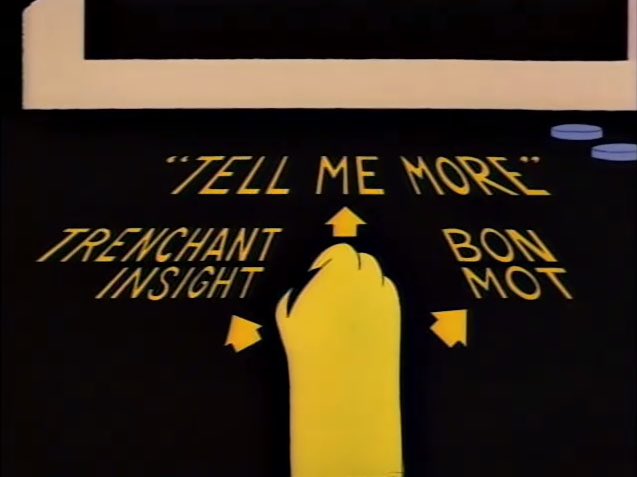You’re at a dinner party (or some other similarly sophisticated get-together). You’ve had a couple of drinks, you’ve finally loosened up, you’ve forgotten that you spent Friday afternoon showing Craig from marketing how to read a forwarded email and that you’re going to have to spend a good chunk of Monday doing it too. You wanted to be an artist. You’ve got the humanities degree to prove it.
The conversation takes its turns. Your friends tell you about a conference they recently attended in San Francisco, opportunities they might take to develop a game in Toronto, leadership vacancies.
You tell them about Craig.
Of course, they discuss the housing market.
Finally the conversation moves towards something you might know about; culture. Someone mentions having seen a play, or read a novel, or seen a film adapted from a book. And you’ve read it, you’ve seen it. The book was better.
They ask you what you thought of it.
“Umm, it was good. I really enjoyed it. I need to read the rest of their work.”
Trenchant insight right there.

I’ve read a bunch of classics and can remember only bits and pieces of them.
Take Moby Dick for example. I remember being weirded out by the continual shifts in and out of it being formatted like a play script. I remember the chapter on making rope. I remember… this bit:
Squeeze! Squeeze! Squeeze! all the morning long; I squeezed that sperm till I myself almost melted into it; I squeezed that sperm till a strange sort of insanity came over me, and I found myself unwittingly squeezing my co-labourers’ hands in it, mistaking their hands for the gentle globules. Such an abounding, affectionate, friendly, loving feeling did this avocation beget; that at last I was continually squeezing their hands, and looking up into their eyes sentimentally
Herman Melville, Moby Dick
I’ve read The Autobiography of Malcolm X and can remember only two things; the image of him straining to read by a bit of dull light filtering down a prison hallway, and his advice on preventing burglary:
A light on for the burglar to see is the very best single means of protection. One of the ideal things is to leave a bathroom light on all night. The bathroom is one place where somebody could be, for any length of time, at any time of the night, and he would be likely to hear the slightest strange sound. The burglar, knowing this, won’t try to enter. ‘It’s also the cheapest possible protection. The kilowatts are a lot cheaper than your valuables.
The Autobiography of Malcolm X
James Joyce is one of my favourite writers and I can’t remember much of A Portrait of the Artist as a Young Man except for the classic moo-cow opening and the bit about forging in the smithy of his soul the uncreated conscience of his race.
I realised what I hadn’t been doing was taking proper notes.
Take a look at my copy of Ulysses for example, loads of notes, and it’s easily the novel I know best. Taking notes helps you think and helps you remember, and there’s loads of different ways to do it.

I journal, and some of my thoughts on my reading go in there. I’ve started keeping a spreadsheet where I put a one or two sentence review of every book I finish. This blog plays a part in me actually remember my reading and making some use of it, too. I’ve been endeavouring to keep more personal notes and to make them useful and share them.
I’ve also started keeping a commonplace book.
I’ve known about them for a long time, but in my recent drive to just take more notes in general, I decided to give it a go. I came across the idea again while researching Zettelkasten, which I ended up not trying because it just looks like too much work, whereas copying down the odd quote I found interesting seemed manageable.
Some Things I Enjoy about Keeping a Commonplace Book
- It makes me feel like I’m back at uni, a bit. Anything that makes you feel ten years younger is worth doing.
- It did increase my comprehension and my recall. I tried my best to treat my books the way C.S. Lewis suggests; like toys. Flipping back through them at the end to look for quotes I wanted to copy down helped me recall what I’d read and cement it.
- The copying down fixed the ideas further, and also acted a little bit like a gym for my fingers. Hunter S. Thompson said he learned a lot about writing by literally copying out great works of literature to see what it felt like to copy those words down, to feel them being written by his own fingers. Keeping a commonplace book is microdosing this effect without having to type out The Great Gatsby.
- It’s a great way to form connections and stockpile material for blog posts.
Some Things I Wish I’d Known about Keeping a Commonplace Book
- Leave a few pages at the start for a table of contents. Leafing through the whole thing to find notes on a particular book might increase your memory of what you’ve copied overall (see my point above in “Some Things I Enjoy…”), but in the moment it it just frustrating. You want that quote for a blog post. You need that quote for a blog post. Your blog post won’t be complete unless you find that bit you copied from Moby Dick where he talks about how much he loves squeezing sperm.
- Don’t be overzealous. I remember my first year of uni – people would take way too many notes, me included, up to and including writing down everything the lecturer said verbatim. I think the first book I took notes from for my commonplace was The Winds Twelve Quarters and The Compass Rose (see my reviews here and here). You know what le Guin is like. I underlined every other sentence and then copied it all down dutifully. This lead to…
- …me feeling bad about finishing books, because I’d then have a load of work to do. I know, right? Do yourself a favour and don’t introduce any more friction into your reading experience than absolutely necessary. Selecting what bits are resonating with you and that you want to remember is an important part of the process.
To be entirely truthful with you, keeping a commonplace book hasn’t been a priority for me the last few months. I’ve finished five or six books without worrying about copying any quotes down. I think the most useful part of the exercise might actually be taking the time to have a flick through a book when you’ve finished it, just to refresh bits of it in your memory while it’s still recent.
This is a particularly good tip for e-books, I think. (I read this somewhere and can’t remember where, sorry.) Part of the reason we have an easier time recalling information from printed text as opposed to reading on a screen is that printed text engages our spatial and tactile memory. You remember a quote saying a certain thing, but you also remember it being in a footnote on the bottom right of a page, and not having many pages left in your right hand. That can be lost with an e-book, but you can re-engage that sense by taking time to flip through an e-book before reading it in earnest, making sure you highlight and create notes, and then going back through checking those highlights and notes when you finish. (Again, I read a post to this effect somewhere and now cannot find it, because, as you see, while I am engaged in improving my note-taking practise, it isn’t perfect. If you recognise this advice as your advice, please let me know and I’ll credit you.)
Have you tried keeping a commonplace book yourself? Do you have any advice? Is there anything I’m doing wrong? Please do say in the comments!



Sounds like a familiar scenario! Sometimes it’s hard to find the right words to articulate our thoughts, especially in a social setting. But hey, at least we’re keeping the conversation flowing. lol -ArConsultings.org
Haha, someone has to!
I’ve found note-taking invaluable as a tool for reviewing, it lassos thoughts, anchors them down and allows them to marinate. And sometimes when the subject is a ‘big question’ like consciousness or identity, you get new insights that you never had before.